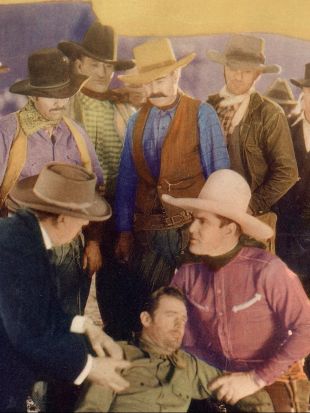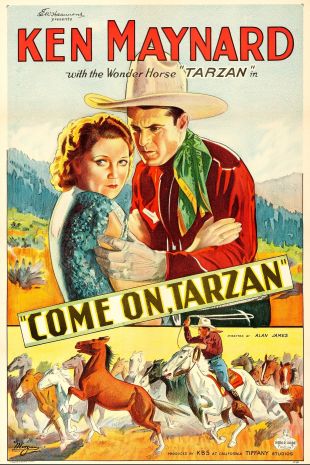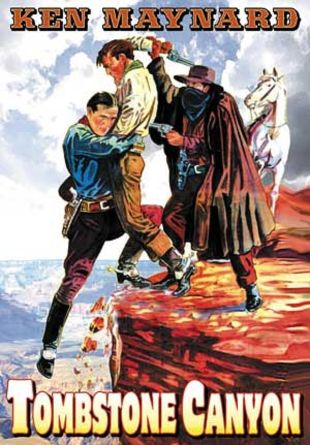One of the best movie equestrians of all time, Ken Maynard had been a 1920 world champion trick-rider and had toured with Pawnee Bill (aka Ted Wells) and Ringling Bros. before doubling for Marion Davies and playing the small, but important, role of Paul Revere in Janice Meredith (1924). A year later, Maynard starred in poverty row producer J. Charles Davis in a series of very low-budget oaters that also featured a group of ex-Follies girls, an odd mix that, in many ways, foreshadowed Maynard's later career and ultimate downfall. From Gower Gulch, Ken Maynard moved up to become First National's resident cowboy hero prior to the advent of sound. The Maynard-First National Westerns were top-flight affairs, with the star performing daring feats on his famous palomino horse, Tarzan. (A copyright infringement suit by Edgar Rice Burroughs, the creator of the pulp-fiction jungle hero of the same name, was finally dismissed in 1935.) The string of box-office and critical successes, of which, sadly, few examples remain, ended when Maynard left First National in favor of more pedestrian Universal. Increasingly difficult to handle, Maynard's reign at Carl Laemmle's huge, family-oriented lot proved brief, however, and he returned to star for a poverty row company, in this case Samuel Bischoff's KBS. Universal brought him back in 1933 as a replacement for the retiring Tom Mix, but Maynard's ego had, by then, gotten nearly out of control. He is credited with introducing the Singing Cowboy fad at this juncture (despite a voice that he himself often dismissed as "nasal soundin'" and amateurish, at best) and his Westerns became increasingly flamboyant, both in attitude and expenditure. The star, who had become his own producer, spent money with abandon, but the market for B-Westerns was diminishing and the otherwise so avuncular Carl Laemmle summarily replaced him with the less expensive (and far less volatile) Buck Jones. Still a potential moneymaker in the hinterlands, Maynard continued to star in low-budget Westerns through the mid-'40s -- at a reported salary of 850 dollars per picture as opposed to the 10,000-dollar paycheck he had received in his heyday -- but an ever expanding waistline and an impossible ego put the final nails in his cinematic coffin. Sadly, Maynard was never able to shake rumors that he had mistreated his equine co-stars and spent his declining years if not in outright poverty then in very diminished circumstances and, some said, an alcoholic stupor. One of the great showmen of early Hollywood action fare, Maynard died at the Motion Picture Country House and Hospital in Woodland Hills, CA. He was preceded in death by his brother, ultra-low-budget Western star, stunt double, and all-around good fellow Kermit Maynard, with whom he had always retained a rather strained relationship.
Ken Maynard
Share on


